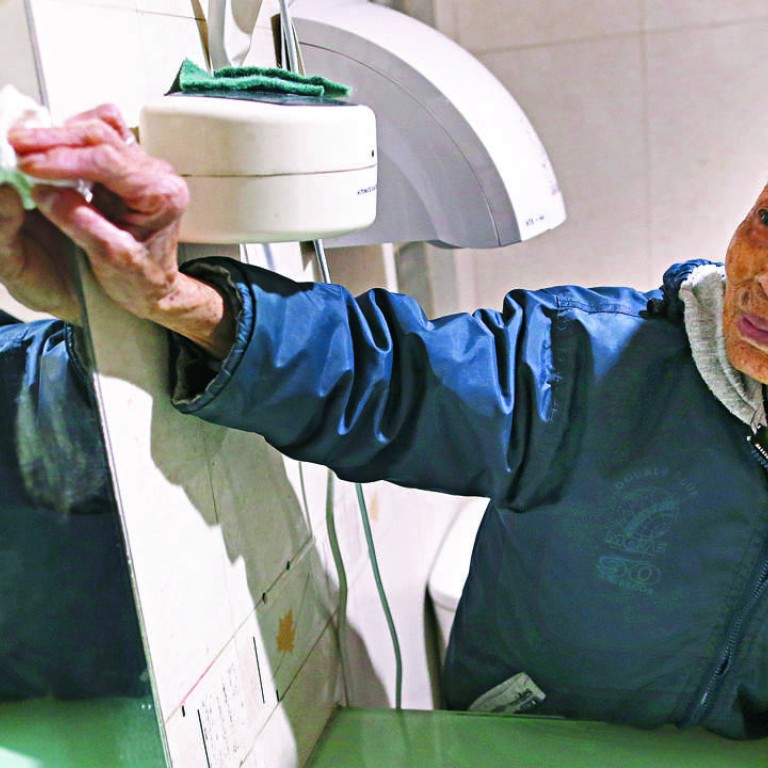
Retire at 60? Don’t force it ... why we need Hong Kong’s ageing population to keep working
Nearly one in three people in Hong Kong will be aged 65 or over in two decades’ time, while the city is on track to lose 14 per cent of its labour force over the next 50 years
“Working makes me feel I’m still valued,” said Wong Siu-ying, who at 87 years of age is working as a cleaner, relishing the active job which she says keeps her physically strong and mentally fresh.
“It not only helps me earn a living without relying on my children and the government, but it also enables me to carry on as a part of society.”
Wong is among thousands of older Hongkongers challenging traditional ideas about the “proper age” to leave work.
And in Hong Kong, with a large ageing population poised to create unprecedented demands on the public purse, this is a big issue.
Government statistics show that nearly one in three people in Hong Kong will be aged 65 or over in two decades’ time, while the city is on track to lose 14 per cent of its labour force over the next 50 years.
Earlier this month, a public policy expert at Hong Kong University of Science and Technology said the government should see the “silver population” as a new force to contribute to the economy in a bid to alleviate problems these demographic shifts would cause.
Jack Goldstone, director of the newly established Institute for Public Policy, said many saw older workers as a cost, not a resource, and a shift in attitude was
necessary.
“We are running into a situation where younger workers will be scarce, and older workers need to be seen as a resource because there are going to be too many of them if they are just allowed to become a cost,” he said.

Goldstone said many workers aged 65 to 70 could still work full-time in offices or on assembly lines with minor adjustments to the working environment, such as more lighting and softer seats, because “people now aged 70 have many of the capacities that we used to associate with people who were 55 to 60”.
And a number of other social policy researchers and campaigners agree.
They say going the extra mile to keep older people working in Hong Kong could lead to a win-win-win situation: older citizens get the chance to stay active and engaged through work; businesses have a previously untapped supply of workers; and the burden on government of an ageing population is reduced.
Anna Lai Wong Oi-ling, executive director of Hong Kong Ideas Centre, was lead author of a study on the “young-elderly” in Hong Kong which found many older workers wanted to continue working.
According to the study, released in 2014, two thirds of citizens interviewed said they were eager to work until they turned 65 or older, citing confidence in their physical or mental strength, and their desire to ease the cost on their children.
The study also found working longer could enhance older people’s quality of life.
“Meanwhile, employers are also able to reap the rewards of hiring older workers as they are inclined to be more reliable and loyal to their companies,” Lai said.
While there is no standard retirement age in Hong Kong, many employers insist on employees retiring at 60. But people can only withdraw accrued benefits from the Mandatory Provident Fund (MPF) – Hong Kong’s official pension scheme – at 65.
Hong Kong may still be better-off than other advanced economies such as Japan in terms of labour supply, but it faced a more urgent issue of lacking a viable retirement protection scheme, argued Hong Kong University’s Dr Ernest Chui Wing-tak, who has researched population policy.
“A mandatory retirement age must be accompanied by a viable pension scheme,” Chui said. “But the MPF scheme is very ineffective in terms of ‘replacement rate’ and thus cannot satisfy people’s need after they retire. Therefore, allowing the elderly to continue working is good.”
And Hongkongers generally live longer than other people. At 81.2 years, Hong Kong men live longer than any other men in the world, while on average the city’s women live even longer, for 86.9 years.
Dr Mak Kin-wah, chairman of the Hong Kong Society for the Aged (SAGE), said working could improve mental and physical well-being as it enriched seniors’ lives and enable them to come out of their shell. He said many older Hongkongers were capable of working beyond their 60s.
“This generation of baby boomers [born 1946-1964] are different in the sense that they are healthier, better-educated and more tech-literate,” Mak said.
Professor Terry Lum Yat-sang, head of the Department of Social Work and Social Administration at HKU, said it had got easier for people to work past the normal retirement age as the city’s job market was less dominated by physically taxing manufacturing jobs.
“With a greying population, the labour crunch will leave lots of positions unfilled in a few decades,” Lum said.
“Employers will not be able to hire as many young people sooner or later, and society will have to have some seniors kick their retirement plans down the road.
“Both [Hong Kong tycoons] Li Ka-shing and Cheng Yu-tung are still working although they are in their 80s and 90s.
“So I wouldn’t side with those who claim seniors citizens can’t do well because their body and brain deteriorate with age.”

